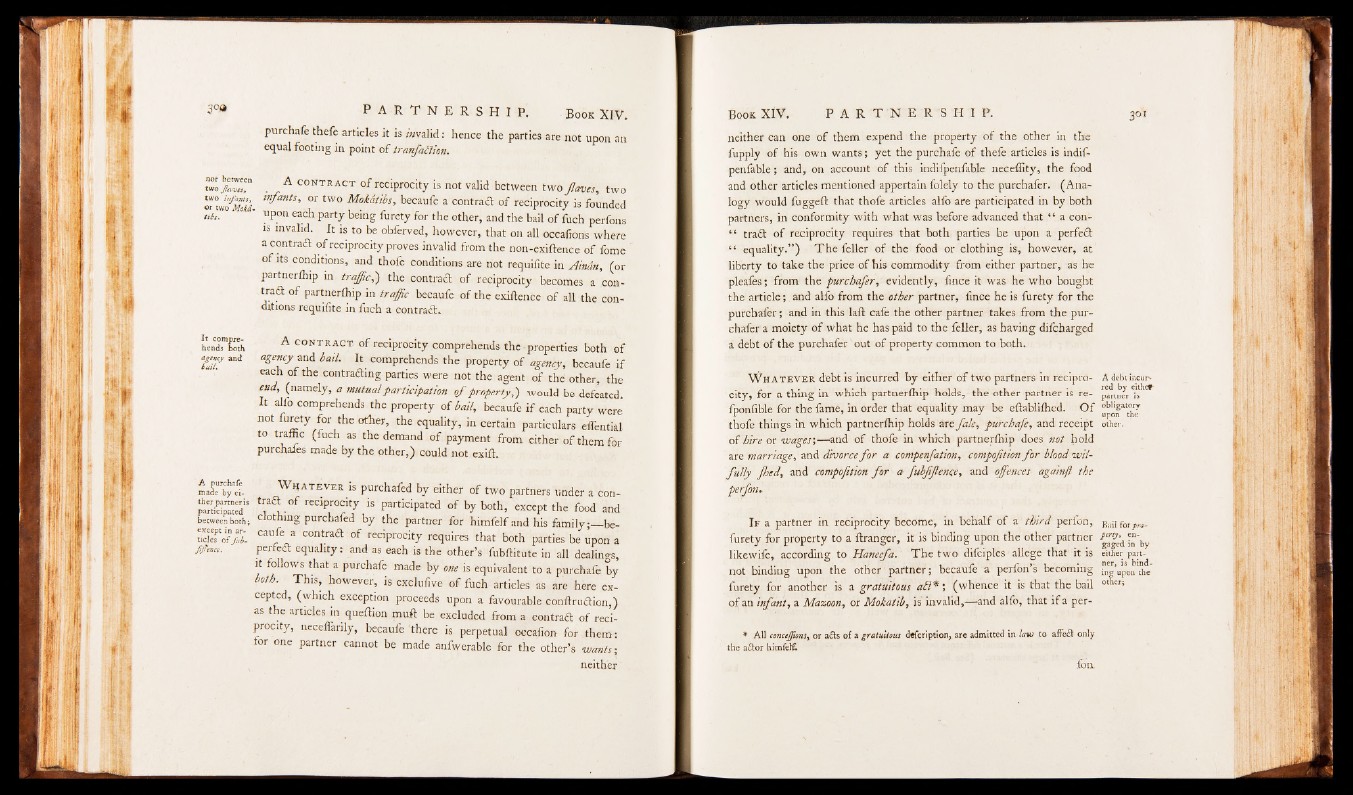
purchafe thefe articles it is /«valid : hence the parties are not upon an
equal footing in point of tranfallion.
. A CONTRACT of reciprocity is not valid between two Jlaves, two
m tw"/m û m- 'anlS’ 0r two MokâtibU becaufe a contraft of reciprocity is founded
i,6,. ° 1 l,Pon each party being furety for the other, and the bail of fuch perfons
is invalid. It is to be obferved, however, that on all occalions where
a contraft of reciprocity proves invalid from the non-exiftence of fome
of its conditions, and thofe conditions are not requifite in Jinan, (or
partnerlhip in traffic,) the contra £t of reciprocity becomes a ,con-
traft of partnerlhip in traffic becaufe of the exiftence of all the conditions
requifite in fuch a contract.
hend^both A C0NTRAC'r of reciprocity comprehends the properties both o f
Z ° f “ d haiL 11 ^ P ^ h e n d s the property of agency, becaufe if
each of the contrading parties were not the agent of thé other, the
end, (namely, a mutual participation o f property,) would be defeated.
It alfo comprehends the property of bail, becaufe i f each party were
not W y for the other, the equality, in certain particulars elfential
to traffic (fuch as the demand of payment from either of them for
purchafes made by the other,) could not exift.
m aH y t W hatever is purchafed by either of two partners under a con-
tr,a£î . 0f reClp,r°Clty is ParticiPated of by both, except the food and
between both; clothing purchafed by the partner for himfelf and his family • betSeTof"/!
CaUrfe a “ ntraa of reciprocity requires that both parties be upon a
pMa. perfeft equality: and as each is the other’s fubftitute in all dealings,
it follows that a purchafe made by one is equivalent to a purchafe by
both. This, however, is exclufive of fuch articles as are hère excepted,
(which exception proceeds upon a favourable conftruftion,)
as the articles in queftion mud be excluded from a contrait of reciprocity,
necelfarily, becaufe 'there is perpetual oecafion for them :
for one partner cannot be made anfwerable for the other’ s wants ;
neither
neither can one of them expend the property of the other in the
fupply of his own wants; yet the purchafe of thefe articles is indif-
penfable; and, on account of this indifpenfable neceflity, the food
and other articles mentioned appertain folely to the purehafer. (Analogy
would fuggeft that thofe articles alfo are participated in by both
partners, in conformity with what was before advanced that “ a con-
“ trait of reciprocity requires that both parties be upon a perfedt
“ equality.” ) T h e feller of the food or clothing is, however, at
liberty to take the price of his commodity from either partner, as he
pleafes; from the purehafer, evidently, fince it was he who bought
the article; and alfo from the other partner, fince he is furety for the
purehafer; and in this laft cafe the other partner takes from the pur-
chafer a moiety of what he has paid to the feller, as having difeharged
a debt of the purehafer out of property common to both.
W hatever debt is incurred by either of two partners ire reciprocity,
for a thing in which partnerlhip holds, the other partner is re-
fponfible for the fame, in order that equality may be eftablilhed. O f
thofe things ih which partnerlhip holds are fale, purchafe, and receipt
of hire or wages',—and of thofe in which partnerlhip does not hold
are marriage, and divorce fo r a compenfation, compoftion fo r blood •wilfu
lly Jhed, and compojition fo r a fubjijlence, and offences againfl the
perfon.
I f a partner in reciprocity become, in behalf of a third' perfon,
furety for property to a ftranger, it is binding upon the other partner
likewile, according to Haneefa. The two difciples allege that it is
not binding upon the other' partner; becaufe a perfon’s becoming
furety for another is a gratuitous a d *', (whence it is that the bail
of an infant, a Mazaon, or Mokatib, is invalid,— and alfo, that if a per-
* A ll concejfioniy or a£ts of a gratuitous defeription, are admitted in law to affe£t only
the a£tor himfelfc
foil.
A debt incurred
by either
partner is
obligatory
upon the
other.
Rail for property,
engaged
in by
either partner,
is binding
upon the
others